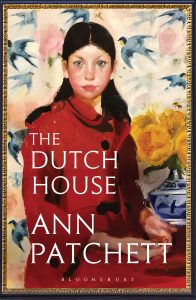 Published by Bloomsbury (UK)/HarperCollins (US) 24 September 2019
Published by Bloomsbury (UK)/HarperCollins (US) 24 September 2019
352pp, hardback, £18.99/$27.99
Reviewed by Alison Burns
A new novel from award-winning Ann Patchett (author of seven previous novels, including Bel Canto and Commonwealth) is quite something to look forward to. Here, she writes of family ties coming undone, of the lifelong impact of childhood experience, of the power of place – and of love – in our lives. She asks a question about maternal responsibility that remains, in the end, unresolved. Not for nothing does Patchett have a reputation for painful as well as compelling storytelling.
Narrator Danny Conroy is a property developer in Manhattan. Buildings obsess him, and none more so than the strange house in which he was brought up. Known as ‘the Dutch House’, his baroque childhood home was the scene both of painful rupture and of vigilant care, the latter from Danny’s older sister, Maeve, and from the household servants. The mother, Elna, has left. The father, Cyril, himself a property developer, thinks only of buildings, repairs and rent-collection. Maeve is the one who gets Danny off to school and looks after him in every other way, as a mother would. It is a story of terrible neglect and unbreakable loyalty. It is also an object lesson in how we become what we are. The one thing that keeps Maeve going is the care she once received from her mother before she ‘went crazy’. The very foundation of Danny’s life is the business of real estate, the only thing his father taught him.
As we follow the story, it becomes clear that a mistake was made, way back, when Cyril ‘rescued’ his friend’s sister from a convent and married her. Had he not gone overboard for the exaggeratedly grand Dutch House, she might have stayed, and her children’s lives been different. As it is, her son and daughter, largely cut out of their father’s legacy by a second wife, choose lives that are essentially versions of waiting for their mother to come back. Maeve, a first-rate mathematician, spends her entire working life in one local food company. Danny trains to be a doctor but never practises, diving sideways instead into the world of buildings. Whenever they get the chance, they go back to the Dutch House and sit in Maeve’s car, remembering it.
A story of loss, of ghosts, of what Danny calls ‘a house on fire’, The Dutch House brings closure of a sort but is not shy of leaving the facts of pain exposed.
